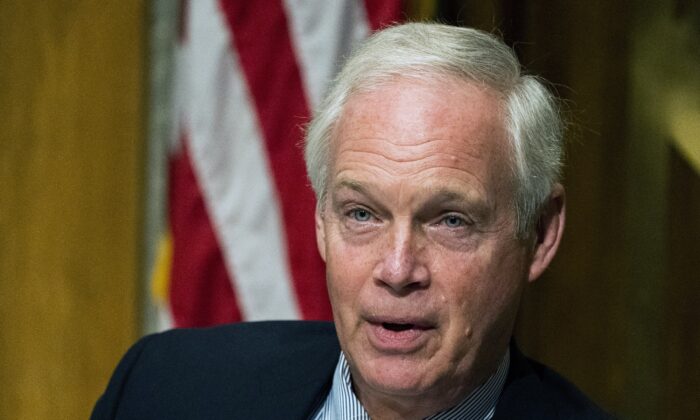Sen. Ron Johnson (R-Wis.) is challenging the heads of the top three federal health agencies to stop stonewalling Congress and explain why their vaccine safety and surveillance promises don’t match their actions.
In a July 13 letter made public late on July 14, Johnson, ranking Republican on the Senate Homeland Security and Government Affairs Committee, said he was encouraged in October 2020 by a videoconference among the National Institutes for Health (NIH), the Centers for Disease Control and Prevention (CDC), and the Food and Drug Administration (FDA).
“A portion of that meeting detailed the multiple surveillance systems that would monitor the safety and efficacy of any vaccines” receiving federal approval in the treatment and prevention of the CCP virus, also known as the novel coronavirus, Johnson told NIH Director Francis Collins, CDC Director Rochelle Walensky, and Acting FDA Commissioner Janet Woodcock.
“In general, the vaccine surveillance plan described on October 22 appeared comprehensive, and would have instilled a great deal of confidence in the agencies’ commitment to vaccine safety and efficacy to anyone listening to the presentations at that time,” Johnson wrote.
“Unfortunately, your agencies’ lack of response to congressional oversight letters, combined with my discussions with agency officials and individuals who believe they have experienced vaccine injuries, leads me to believe the preauthorization safety surveillance hype does not appear to match the agencies’ actual performance.”
Of particular concern to Johnson were “the alarming safety signals emanating from VAERS (Vaccine Adverse Event Reporting System, established July 1, 1990)” that he brought up “with Director Collins in a meeting with other Senate Republicans on April 27, 2021.”
The VAERS system is the government’s primary database for safety and performance surveillance of all vaccines, not just the three CCP virus vaccines currently being administered in the United States.
Johnson said he found what he described as Collins’s “dismissive reaction to my concerns” as “more than troubling. By that date, the number of deaths following COVID-19 vaccination reported to VAERS had already reached 3,411, with 1,349 or 39.5 percent of those deaths occurring on Day 0, 1, or 2 following vaccination.”
He noted that prior to the CCP virus vaccines, “VAERS averages 50,000 adverse event reports annually (approximately 1,000 per week). The [CDC] and FDA subsequently informed my staff that as of June 28, 2021, VAERS had received 410,000 submissions detailing adverse events following a COVID-19 vaccination.”
“Of those submissions, approximately 41,000 reports meet the regulatory definition of ‘serious adverse event’ and are supposedly followed-up upon. As of July 2, 2021, VAERS reported 5,247 domestic deaths with 1,814 or 34.6 percent of those deaths occurring on Day 0, 1, or 2 following receipt of a COVID-19 vaccine,” he wrote.
The Wisconsin Republican said that he “expected the director of NIH to share my concerns, but he, together with our other federal health agencies, has continued to downplay the significance of what VAERS is signaling.”
Johnson’s concerns have been further compounded, he told the three agency chiefs, by the recent change in tone from them regarding the efficacy of the VAERS system.
“Now, nine months and 438,441 reported adverse events later, health care professionals are publicly downplaying the effectiveness and validity of these same systems,” Johnson said.
“For example, on May 3, 2021, Dr. Paul Offit, who is member of an FDA advisory committee, stated ‘So [VAERS is] a noisy system that frankly is more frightening than helpful.’ Which is it?” he asked.
Johnson then addressed multiple questions to each of the agency heads and pointed out in his queries to Collins that the NIH has ignored his multiple requests for information regarding the agency’s research on potential CCP virus treatments.
In a recent telephone discussion with Collins, Johnson said he “indicated NIH has spent hundreds of millions of dollars and researched hundreds of potential existing drugs for treating COVID-19. Unfortunately, even though I have repeatedly asked for you to provide detail and documentation of these efforts, NIH has stonewalled my oversight request and to date I’ve received no relevant information.”
Media spokesmen for each of the three agencies declined to respond to The Epoch Times’ request for comment.

